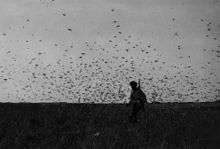Definify.com
Webster 1913 Edition
Swarm
Swarm
,Noun.
1.
A large number or mass of small animals or insects, especially when in motion.
“A deadly swarm of hornets.” Milton.
2.
Especially, a great number of honeybees which emigrate from a hive at once, and seek new lodgings under the direction of a queen; a like body of bees settled permanently in a hive.
“A swarm of bees.” Chaucer.
3.
Hence, any great number or multitude, as of people in motion, or sometimes of inanimate objects;
as, a
. swarm
of meteoritesThose prodigious
swarms
that had settled themselves in every part of it [Italy]. Addison.
Syn. – Multitude; crowd; throng.
Swarm
,Verb.
I.
[
imp. & p. p.
Swarmed
; p. pr. & vb. n.
Swarming
.] 1.
To collect, and depart from a hive by flight in a body; – said of bees;
as, bees
. swarm
in warm, clear days in summer2.
To appear or collect in a crowd; to throng together; to congregate in a multitude.
Chaucer.
3.
To be crowded; to be thronged with a multitude of beings in motion.
Every place
swarms
with soldiers. Spenser.
4.
To abound; to be filled (with).
Atterbury.
5.
To breed multitudes.
Not so thick
Bedropped with blood of Gorgon.
swarmed
once the soilBedropped with blood of Gorgon.
Milton.
Swarm
,Verb.
T.
To crowd or throng.
Fanshawe.
Webster 1828 Edition
Swarm
SWARM
,Noun.
1.
In a general sense, a large number or body of small animals or insects, particularly when in motion; but appropriately, a great number of honey bees which emigrate from a hive at once, and seek new lodgings under the direction of a queen; or a like body of bees united and settled permanently in a hive. The bees that leave a hive in spring, are the young bees produced in the year preceding. Ex.8. Judges 14.2.
A swarm or multitude; particularly, a multitude of people in motion. Swarms of northern nations overran the south of Europe in the fifth century.Note.--The application of this word to inanimate things, as swarms of advantages, by Shakespeare, and swarms of themes, by Young, is not legitimate, for the essence of the word is motion.
SWARM
,Verb.
I.
1.
To collect and depart from a hive by flight in a body, as bees. Bees swarm in warm, clear days in summer.2.
To appear or collect in a crowd; to run; to throng together; to congregate in a multitude. In crowds around the swarming people join.
3.
To be crowded; to be thronged with a multitude of animals in motion. The forests in America often swarm with wild pigeons. The northern seas in spring swarm with herrings. Every place swarms with soldiers.
[Such phrases as 'life swarms with ills,' 'those days swarmed with fables,' are not legitimate, or wholly obsolete.
4.
To breed multitudes.5.
To climb, as a tree, by embracing it with the arms and legs, and scrambling. At the top was placed a piece of money, as a prize for those who could swarm up and seize it.
Note.--This, by the common people in New England, is pronounced squirm or squurm, and it is evidently formed on worm, indicating that worm and warm, on which swarm and squirm are formed, are radically the same word. The primary sense is to bend, wind, twist, as a worm, or a swarm of bees. It may be formed on the foot of veer, vary.
SWARM
,Verb.
T.
Definition 2026
swarm
swarm
English
Noun

swarm of locusts.
swarm (plural swarms)
- A large number of insects, especially when in motion or (for bees) migrating to a new colony.
- (Can we date this quote?) Template:W
- a deadly swarm of hornets
- (Can we date this quote?) Template:W
- A mass of people, animals or things in motion or turmoil.
- a swarm of meteorites
- (Can we date this quote?) Addison
- those prodigious swarms that had settled themselves in every part of it [Italy]
- (computing) A group of nodes sharing the same torrent in a BitTorrent network.
Translations
large number of insects
|
|
a mass of people or animals in turmoil
|
|
Verb
swarm (third-person singular simple present swarms, present participle swarming, simple past and past participle swarmed)
- (intransitive) To move as a swarm.
- 1915, George A. Birmingham, “chapter I”, in Gossamer (Project Gutenberg; EBook #24394), London: Methuen & Co., published 8 January 2013 (Project Gutenberg version), OCLC 558189256:
- There is an hour or two, after the passengers have embarked, which is disquieting and fussy. Mail bags, so I understand, are being put on board. Stewards, carrying cabin trunks, swarm in the corridors.
-
- (intransitive) To teem, or be overrun with insects, people, etc.
- (Can we date this quote?) Edmund Spenser
- Every place swarms with soldiers.
- (Can we date this quote?) Edmund Spenser
- (transitive) To fill a place as a swarm.
- (transitive) To overwhelm as by an opposing army.
- To climb by gripping with arms and legs alternately.
- (Can we date this quote?) William Coxe
- At the top was placed a piece of money, as a prize for those who could swarm up and seize it.
- 1919, W. Somerset Maugham, The Moon and Sixpence, chapter 55
- She called out, and a boy came running along. He swarmed up a tree, and presently threw down a ripe nut. Ata pierced a hole in it, and the doctor took a long, refreshing draught.
- (Can we date this quote?) William Coxe
- To breed multitudes.
- (Can we date this quote?) John Milton
- Not so thick swarmed once the soil / Bedropped with blood of Gorgon.
- (Can we date this quote?) John Milton
Translations
to move as a swarm
to teem, or be overrun with insects
to fill a place as a swarm
to overwhelm
|
to climb by gripping with arms and legs
|
|
See also
- Appendix:English collective nouns